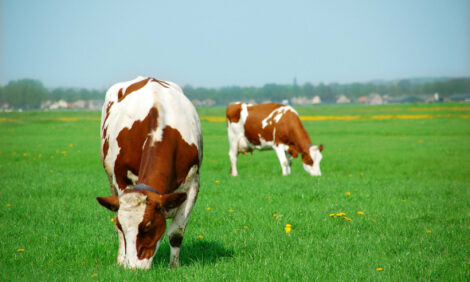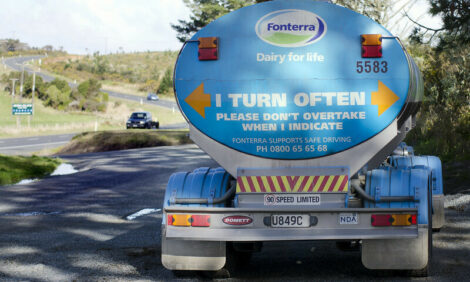



Protests by European Milk Producers
EU - Delegations of milk producers went to Place Luxembourg with 14 Faironikas, the life-size cows in the national colours of the members of the European Milk Board (EMB), explaining why it was necessary to enable the milk producers to pool sufficiently in independent producer organisations and set up a monitoring agency to keep an eye on the milk market.This, they said, was the precondition for sustainable agriculture in the consumers’ interest.
In three weeks’ time, on 24/25 May 2011, the European Parliament’s Agricultural Committee will decide on James Nicholson’s Report, which comments on the European Commission’s proposed legislation for the milk market.
In the opinion of the EMB milk producers, the current draft contains clear weaknesses and will not be able to bring about the strengthening of the producers’ position in the milk market that the Parliament also wishes.
However, the delegations from the various member countries still feel there are good chances of improving the report with concrete amendments.
Sieta van Keimpema, Vice-President of the EMB said: “We are here today outside the European Parliament in Brussels to once again hand our demands over to interested MEPs with greater urgency. There is fire in the air – that is the symbol of the crises that are to be expected again in the milk market if the milk producers are not given the opportunity within a basic legal framework to unite in order to have an influence on the milk market and thus achieve fair prices.” What was crucial as regards pooling was that this could be unlimited on a national level and be allowed up to 30% across the EU.
Willem Smeenk, Member of the EMB Executive Committee added: “Pooling invariably means bringing the producers together in independent producer organisations regardless of whether they supply their milk to a privately run or co-operative dairy.”
So far the draft legislation has not provided for this. On the contrary, many parts of it aim to grant the co-operatives special status and also prohibit what is termed double membership in co-operatives and producer groups.
EMB President Romuald Schaber comments: “Large co-operatives and producers do not have the same interests when it comes to farm-gate prices. That is why producers must have the possibility vis-à-vis all dairies of stipulating sales rules and base prices via their own producer organisations.”
Schaber added: “The milk market is an extremely complex international market that is supposed to ensure that European consumers are supplied with high-quality, sustainably produced dairy products. The EU must create a framework that enables the milk market and its players to fulfil this societal function.
"By keeping an eye on the market and laying down precise stipulations based on production costs, a monitoring agency should ensure that the volume of milk produced is in line with demand. If the producers’ position is also strengthened through greater possibilities of pooling, cost-covering producer prices will be possible in the future.”
Consumer representatives should be able to support the agency by being co-opted onto it, for they have an interest in a dependable supply of fresh produce, in farmer-owned farms and fair prices all along the food chain, from the producer to the consumer.
After the demonstration outside the European Parliament the dairy farmers marched to the European Commission to demonstrate there against the ultraliberal policy of the European Commissioner for Trade Karl de Gucht.
Erwin Schöpges, Member of the Executive Committee of the EMB from Belgium said: “Mr De Gucht is destroying farming structures with his policy of “world market competitiveness at any price”; the only ones that profit are the dairies and the banks.”
The milk producers also showed their solidarity with their fellow farmers in Canada, who for a long time have achieved cost-covering farm-gate prices by systematically adjusting production to demand. If Mr De Gucht has his way, then the Canadian market is soon to be flooded with cheap, European dairy produce.
TheCattleSite News Desk


